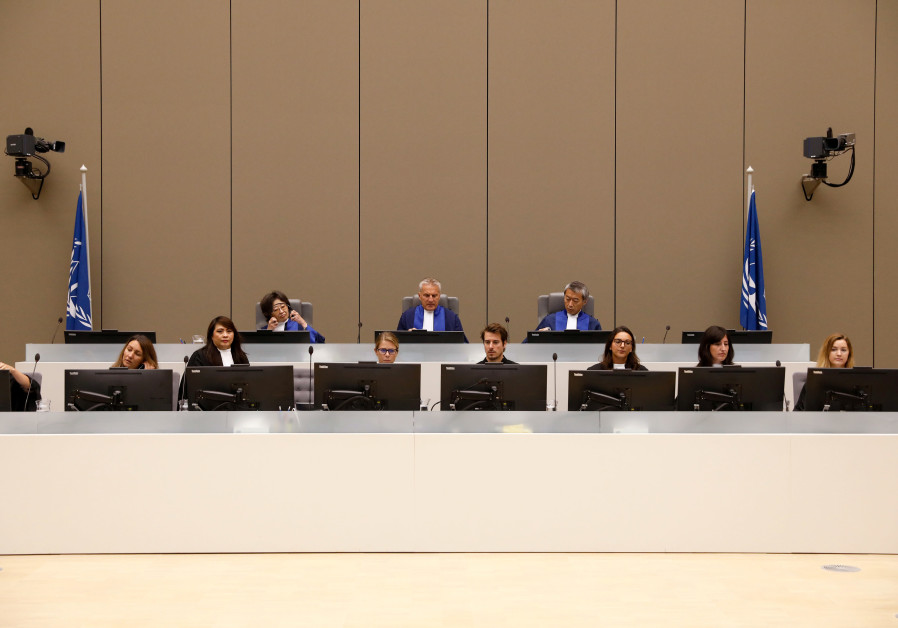Analysis: IDF’s syncing of war crimes decisions a message to ICC

Presiding Judge Robert Fremr in the courtroom at the ICC (International Criminal Court) in the Hague, the Netherlands, 2018. (photo credit: BAS CZERWINSKI/POOL VIA REUTERS)
Until Tuesday, an argument could have been made that it was a coincidence.
On August 15, the IDF announced it was closing the Black Friday war crimes probe, the biggest of the 2014 Gaza War in which around 70 Palestinian civilians were killed during one battle.
Only six days later, on August 21, it announced that it was opening a criminal probe into the shooting of two Palestinians on the Gaza border.
At the time, it seemed coordinated that in the same week a four-year-old probe was controversially closed with no charges for the killing of 70 Palestinians, two new probes would be opened for the killing of Palestinians which had occurred one month and four months before.
But the IDF made no official announcement connecting the two, and the 2014 probe certainly was running long before the latest probes even started if the military wanted to deny a connection.
Still, even until Tuesday’s speeches at the Israel Bar Association Conference by Attorney-General Avichai Mandleblit and by Military Advocate General Maj.-Gen. Sharon Afek relating to these decisions, there was a lot pointing toward a coordinated set of decisions and announcements.
After all, with the International Criminal Court prosecution deciding whether to delve deeper into the Israeli-Palestinian conflict, the Black Friday decision left the IDF’s legal division vulnerable to critics’ charges of whitewashing the killing of Palestinian civilians.
But if that was the moment when critics were going to pounce on Israel and try to push the ICC prosecution over the brink into a full criminal investigation of IDF soldiers for war crimes during Operation Protective Edge, the IDF decision on August 21 could halt that momentum.
The IDF could say that it recognized that four years was a long time to decide not to bring charges in the biggest 2014 war crimes probe, but that it was potentially speeded up by quickly opening a criminal probe into much more recent shootings of Palestinians.
Critics would say that only two criminal probes out of an estimated 170 Palestinians killed during the Gaza border crisis is small.
But the IDF could point to the intense domestic criticism it endured in Israel for ordering probes of IDF soldiers in the two killings – in addition to the possibility that there might be more such decisions on the way in the midst of a crisis which is ongoing.
Mandelblit and Afek just about erased any doubt of the coordination of the decisions by highlighting them together on Tuesday at the conference.
Both men noted criticism from both the Left for closing the Black Friday probe and from the Right for ordering criminal probes of IDF soldiers for recent shootings of Palestinians on the Gaza border at all.
Their message to the ICC was clear – the Israeli legal establishment is independent and makes professional and impartial decisions regardless of virtually constant criticism from all sides.
Mandelblit and Afek could present the legal establishment as the mature grown-up who isn’t swayed by populism.
As a side point, their message can only have been helped by the Supreme Court decision on August 19 to double the prison sentence of Israeli border guard Ben Deri from nine to 18 months for the negligent homicide of a Palestinian minor in 2014.
The ICC may not accept this message and may still condemn Israel if it interprets these major events more in line with human rights critics and the UN Human Rights Council.
But militaries around the world will also have noted the balanced message that the IDF tried to present and will likely have sympathy for that message.
This will make it harder for the ICC to get into a legal confrontation with Israel, and if it does, Jerusalem will likely have strong backing from allies that may blunt some of the impact.
Join Jerusalem Post Premium Plus now for just $5 and upgrade your experience with an ads-free website and exclusive content. Click here>>






Comments are closed.